Set up AI agents for customer support in less than 10 minutes
Set up AI agents in minutes
25 important customer service skills to develop in 2026
Sneha Arunachalam .
Aug 2025 .
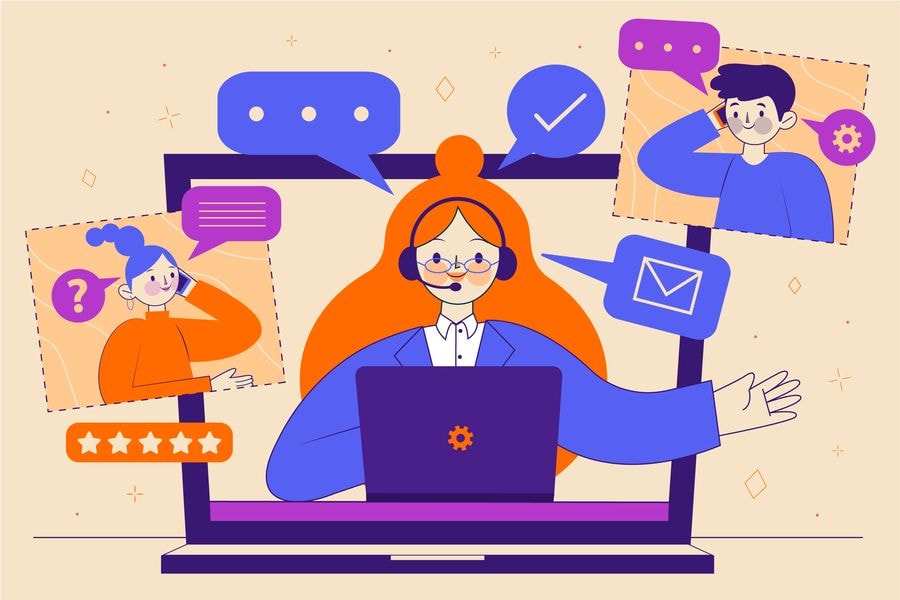
Your business just lost a loyal customer because of one bad interaction. This isn't just a dramatic scenario - it's reality.
Poor customer service costs U.S. businesses $75 billion each year. Customer service now matters as much as the products themselves, with consumers rating it equally important.
We've pinpointed 25 customer service skills that will make businesses stand out. These skills range from emotional intelligence to state-of-the-art technology integration. They're not optional extras but survival tools in today's competitive market.
Importance of customer service in today's business landscape
You might wonder why some businesses thrive while others barely survive. Customer service makes all the difference in today's competitive marketplace. This isn't just a department that handles complaints - it's the core of business success and a powerful edge over competitors.
Microsoft Research's Global State of Customer Service Report reveals something striking - 95% of consumers say their loyalty depends on how companies treat them. The stakes are that high.
Companies lose customers when they fail to deliver good service. Money talks when it comes to good service. Customers gladly spend 17% more at businesses that deliver great experiences, up from 14% in previous years.
The numbers get even better in specific cases. Airline passengers were ready to pay $20 extra for tickets when they got Twitter responses within five minutes.
Customer service drives retention and profitability because:
- Cost efficiency: Getting new customers costs five to seven times more than keeping existing ones. Great service helps businesses keep customers and boost profits.
- Lifetime value enhancement: Bain & Company research shows that a 5% increase in customer retention can boost profits by 25% to 95%. Happy customers tend to:
- Buy again and again
- Try new products
- Spend 31% more than new customers
Customer service shapes how people see your brand at every point of contact. Every interaction gives you a chance to make your brand stronger or weaker.
Happy customers become your best marketers.
They spread positive word-of-mouth - it’s one of the most powerful marketing channels out there. This natural spread of good reviews brings in new customers through trusted referrals and creates an ongoing growth cycle.
Great customer service makes employees happier too. People love working for companies that care about their customers. A positive workplace keeps your core team around longer, and you retain skilled and experienced staff.
Customer expectations keep rising. Businesses must realize that amazing customer service isn't optional. It's crucial to grow and stand out from competitors through eco-friendly growth.
Why customer service skills matter
You've invested in a great website, state-of-the-art products, and smart marketing campaigns. A customer's question or problem can make or break your company's reputation.
This is when customer service skills either shine or become your company's weak spot.
Effect on customer retention and lifetime value
Good customer service skills boost your bottom line through better retention. Happy customers keep coming back and create steady revenue without the high cost of finding new customers.
Finding a new customer costs six to seven times more than keeping an existing one. The chances of selling to an existing customer are 14 times higher than selling to a new prospect.
Loyal customers bring in 6-14 times more value than those who face bad service. This creates steady revenue over time. Returning customers spend 31% more than new ones.
Link to brand reputation and referrals
Every interaction shapes your brand's reputation. Studies show that 80% of customers need to trust a brand before they buy. About 60% say a company's reputation plays a major role in their purchase decision.
Your service team represents your brand. They create lasting impressions. Customers who get great service become your best supporters. Loyal customers are four times more likely to bring in new business. And referred customers stay 37% longer.
Customers stick with companies that provide great service.
ROI on customer service skills
Customer service skills bring measurable returns. Companies can link service efforts to revenue by tracking repeat purchase rates.
Customer service ROI shows up in many ways:
- Saved revenue through less customer loss
- Better customer lifetime value
- Higher order values
- Free word-of-mouth marketing
Customer service isn't just an expense - it makes profit when you develop and use the right skills strategically.
Let’s get into the details of essential customer service skills for 2026, presented in their respective categories.
Core communication skills
A single conversation can shape how you feel about a brand forever.
Communication is the foundation of exceptional customer service. It bridges the gap between what customers need and the solutions they receive.
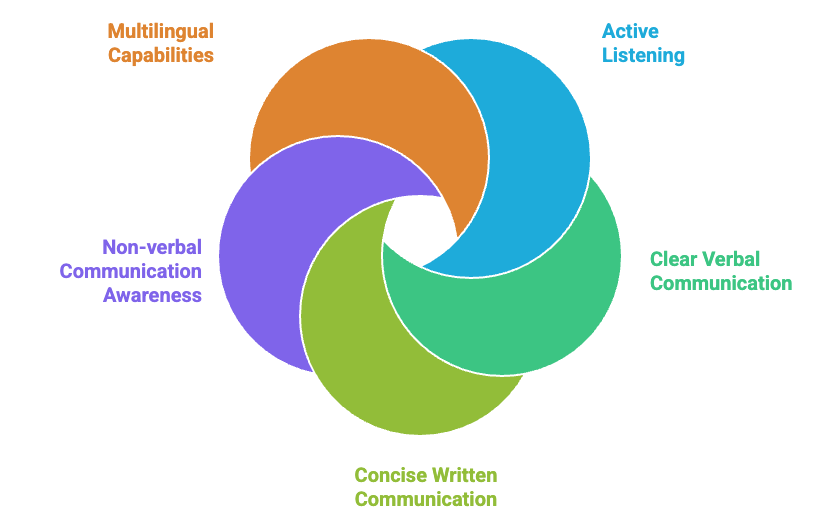
1. Active listening
Active listening is one of the most important customer service skills, yet it’s also one of the most overlooked. It goes far beyond hearing customer words — it requires complete focus, empathy, and intentional understanding before responding.
Studies show that humans can hear 125–250 words per minute, while the brain processes 1,000–3,000 words per minute. This gap often leads agents to jump to conclusions or solutions too quickly. As a result, misunderstandings pile up. In fact, poor communication is responsible for nearly 60% of business problems, making active listening a foundational customer service skill.
Effective listening in customer service includes:
- Allowing customers to speak without interruption
- Acknowledging concerns with phrases like “I understand” or “I see what you mean”
- Repeating or summarizing the issue to confirm accuracy
When agents practice these habits, they reduce unnecessary follow-ups, resolve issues faster, and deliver more accurate solutions. The faster a support agent truly understands the problem, the faster they can solve it — without frustration on either side.
Active listening also builds trust and emotional connection. This is especially important in global support environments, where 7 out of 10 customers prefer service in their native language. Understanding tone, intent, and context becomes just as important as understanding the words themselves.
Among all customer service skills, active listening sets the foundation for everything else — empathy, problem-solving, and clear communication. Without it, even the best tools and workflows fall short.
2. Clear verbal communication
Clear verbal communication is one of the most visible customer service skills because it directly shapes how customers perceive both the agent and the company. The way you speak — not just what you say — can determine whether an interaction feels reassuring or frustrating.
This skill becomes especially critical during phone and video support, where customers can’t rely on written context or visual cues. Important details can easily be missed if explanations are rushed, unclear, or overloaded with jargon.
Agents who communicate clearly reduce misunderstandings and prevent issues from escalating unnecessarily.
Tone and pitch play a powerful role in customer interactions. Your voice often communicates emotion more strongly than words alone.
The same sentence can sound confident, caring, or dismissive depending on how it’s delivered. A calm, steady tone helps defuse tension, while a warm and friendly pitch builds trust — turning routine conversations into positive, memorable experiences.
Clear verbal communication in customer service also relies on positive language. Instead of focusing on limitations, effective agents explain what can be done and clearly outline next steps.
Letting customers know what will happen next — and when — sets expectations and reduces anxiety, even if the final outcome isn’t exactly what the customer hoped for.
Among essential customer service skills, clear verbal communication ensures customers feel informed, respected, and supported throughout the interaction. When customers understand the process, they’re far more likely to stay patient, cooperative, and satisfied.
3. Concise written communication
Concise written communication is one of the most essential customer service skills in today’s digital-first support environment. With email, live chat, and messaging apps dominating customer interactions, how clearly you write often determines how quickly an issue gets resolved.
One effective approach to written communication in customer service is the BLUF (Bottom Line Up Front) method. It places the most important information at the beginning, followed by supporting details.
This structure respects the customer’s time and improves clarity, especially when customers are scanning messages rather than reading them word by word.
Strong customer support writing skills focus on simplicity. Avoid technical jargon and internal terminology that customers may not understand. Use short sentences and bullet points to break up information and make responses easier to digest.
For recurring questions, well-crafted standard responses help maintain consistency while reducing response time.
Reviewing messages before sending them is a non-negotiable habit. Typos, incomplete drafts, or unclear phrasing can quickly damage trust. A quick read-through ensures your message is complete, professional, and easy to understand before it reaches the customer.
Customers also struggle with long blocks of text. Presenting information in short paragraphs with clear spacing makes content easier to visually consume.
Among core customer service skills, concise written communication ensures customers get answers quickly — without confusion, frustration, or unnecessary follow-up.
4. Non-verbal communication awareness
Non-verbal communication awareness is a subtle but powerful part of effective customer service skills. Even when customers can’t see you, non-verbal cues still influence how your message is received.
During voice-only calls, posture plays a bigger role than most people realize. Sitting upright or standing while speaking makes your voice sound more energetic, confident, and engaged. Slouching, on the other hand, often translates into a flat or disinterested tone. Something as simple as posture can significantly change how professional and attentive you sound.
A smile also impacts voice tone. Smiling while speaking naturally softens your delivery and conveys warmth and friendliness — even when the customer can’t see you. This subtle shift helps build rapport and makes interactions feel more human and reassuring.
In video calls or face-to-face support, non-verbal communication becomes even more critical. Body language, facial expressions, and eye contact signal whether you’re fully present. Looking at the customer, maintaining open posture, and responding with natural expressions show that you’re engaged and listening.
Among essential customer service skills, non-verbal communication awareness strengthens trust and emotional connection. When customers feel seen, heard, and valued — verbally and non-verbally — conversations become smoother and relationships grow stronger.
5. Multilingual capabilities
Multilingual capabilities are no longer optional. They are a core part of modern customer service skills, especially for businesses serving customers across regions and time zones.
- Language directly impacts customer choice.
Nearly 70% of global customers prefer brands that offer support in their native language. When customers can explain their problem comfortably, conversations move faster and feel less stressful. - Most businesses still fall short.
Despite clear demand, only about half of brands provide multilingual customer support. This creates friction for customers — and a competitive advantage for companies that get it right. - Multilingual support is more than translation.
Effective language support in customer service requires understanding cultural context, tone, and communication styles. What feels polite in one region may come across as abrupt or unclear in another. - The business impact is real.
Companies with strong multilingual customer service skills see higher customer satisfaction, stronger trust, and better retention. They also scale into new markets without compromising support quality.
Among essential customer service skills, multilingual capabilities help global customers feel understood — not just serviced.
Emotional intelligence skills
Your team's response to a frustrated customer calling about their third billing error this month can make or break the relationship.
The difference between losing them forever and turning them into a loyal supporter comes down to emotional intelligence. These critical skills help service professionals understand and manage emotions better.
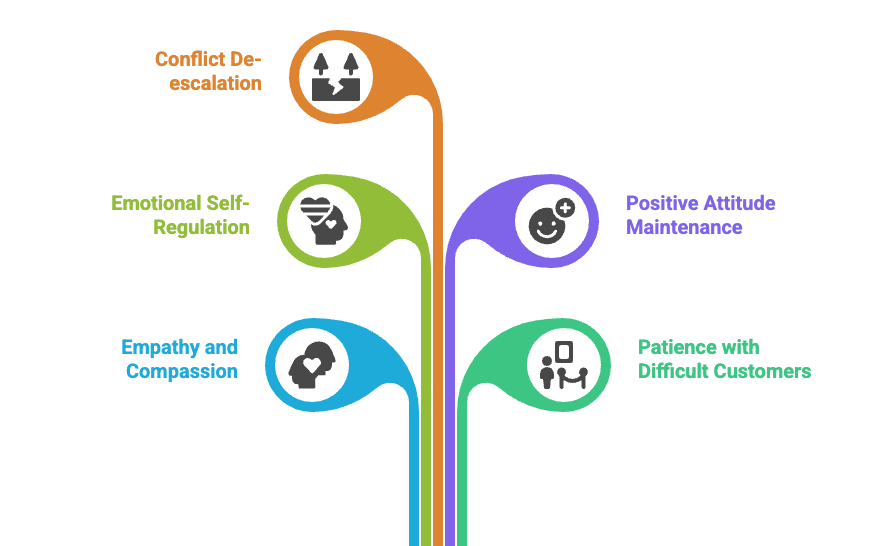
6. Empathy and compassion
Empathy and compassion sit at the heart of strong customer service skills. They are what turn routine support interactions into human, trust-building conversations.
Empathy is a core part of emotional intelligence in customer service. When support agents genuinely understand how a customer feels and see the issue from their perspective, customers feel heard and respected — even before a solution is provided.
- Empathy reduces the impact of mistakes.
Research consistently shows that customers are far more likely to forgive company errors when service representatives respond with empathy. A thoughtful, understanding response can restore satisfaction and prevent customers from walking away. - Compassion builds emotional connection.
Customers don’t just want problems fixed — they want to feel understood. Empathetic responses help calm frustration, lower tension, and create a sense of partnership rather than conflict.
To show empathy and compassion in customer service:
- Acknowledge emotions with phrases like “I understand why that would be frustrating”
- Take responsibility when the company is at fault instead of deflecting blame
- Show genuine interest in resolving the issue, not just closing the ticket
Among essential customer service skills, empathy and compassion create loyalty that policies and processes alone cannot. Customers remember how you made them feel — long after the issue is resolved.
7. Patience with difficult customers
Patience is one of the most essential customer service skills when dealing with frustrated or angry customers. Without it, small issues can quickly escalate into bigger conflicts.
Customer service representatives often act as a calming presence. When emotions run high, a patient response helps slow the conversation down and keeps it focused on resolution rather than confrontation.
- Every customer brings unseen context.
You never fully know what a customer is dealing with outside the conversation. Stress, urgency, or past experiences can strongly influence how they communicate. Recognizing this helps agents respond with understanding instead of defensiveness. - Patience prevents escalation.
Speaking calmly, avoiding rushed responses, and allowing customers to fully express themselves reduces tension. When customers feel heard, they’re far more willing to cooperate. - Tone matters as much as timing.
Representatives who speak softly, pause when needed, and avoid interrupting show that they are committed to finding a solution — not winning an argument.
Among core customer service skills, patience protects both the customer experience and the support team. It turns difficult conversations into productive ones and helps resolve issues without damaging trust.
8. Emotional self-regulation
Self-regulation helps you manage your emotions effectively, especially in tough situations. This skill stops customer service representatives from reacting with irritation that might make customers angrier.
You need to be aware of the difference between reacting and responding to customer queries. Responding after listening to them is the best way to provide resolutions.
Taking everything personal is never going to help at any time. Always have an objective look to ensure smooth operations.
Skilled representatives avoid defensive responses by:
- Using deep breathing techniques to stay calm
- Keeping neutral body language
- Finding solutions instead of becoming defensive
9. Positive attitude maintenance
A positive attitude can transform customer interactions. Representatives who start each conversation with optimism and a genuine desire to help create better outcomes.
Customer service staff's positive approach shapes customer attitudes and responses naturally.
Representatives can keep a positive mindset more easily by taking care of their physical and mental wellbeing through good sleep, exercise, and fun activities. It’s an important skill especially for customer service managers who’ll have to handle their team with care.
Customers leave feeling good about themselves and your company when team members bring positive energy to interactions.
10. Conflict de-escalation
“I'm really frustrated! My order is late again.”
“I'm sorry to hear that. I see that your order is delayed due to a transport issue.”
“It was supposed to arrive yesterday but still nothing.”
“That’s definitely frustrating. I just connected with the concerned and it’s expected to reach you within 48 hours. We’ll ensure this doesn’t repeat in future.”
“Okay, thank you. I just want it sorted.”
That’s an example of how a customer service representative de-escalated an issue.
Some de-escalation techniques can turn tense situations into productive conversations as well. These strategies work by asking open-ended questions, proving feelings right without judgment, and maintaining proper eye contact.
Good de-escalation also moves conversations from problems toward solutions. This approach changes negative energy into shared problem-solving. These techniques, when used properly, stop small misunderstandings from destroying customer relationships.
Problem-solving abilities
A customer comes to you with an unfamiliar problem. Your communication skills and emotional intelligence play a vital role, but you need strong problem-solving skills to succeed. Great customer service transforms challenges into opportunities through smart analysis and innovative solutions.
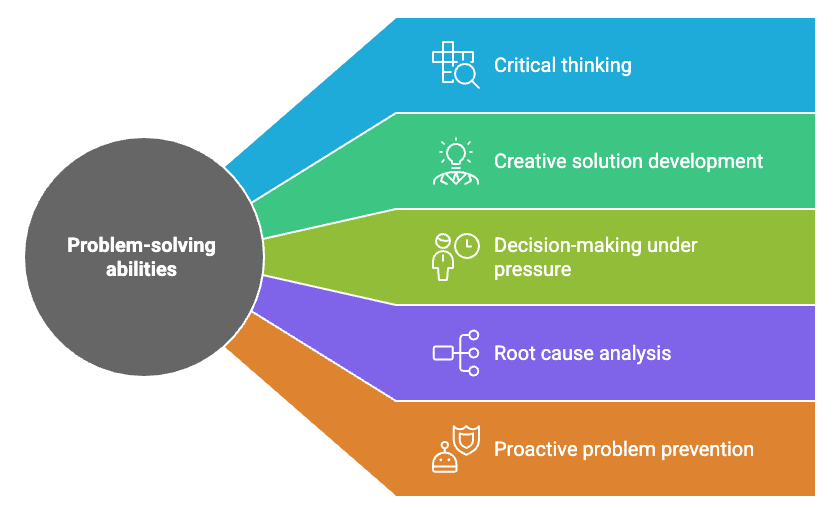
11. Critical thinking
Customer service representatives need to identify and address the root of customer issues instead of just treating symptoms. This approach helps them review situations without bias, collect important information, and create effective solutions. Good critical thinking stops representatives from making assumptions that could result in poor solutions.
These steps will improve critical thinking:
- Collect data systematically to find why it happens
- Challenge assumptions that affect decisions
- Break down customer needs to grasp the complete picture
12. Creative solution development
Standard approaches don't always work, and you need fresh ideas to solve the customer problems. A customer service manager shares this story: "We had a client with high employee turnover in their customer service team. Though it wasn't our usual focus, we built an AI chatbot for routine questions. This solution cut down staff workload and reduced turnover rates substantially."
Customer representatives develop creative solutions when they:
- Think over options beyond standard procedures
- Build mutually beneficial alliances to tackle unique problems
- Create interactive knowledge bases to equip customers
13. Decision-making under pressure
Quick, smart decisions can stop small issues from growing bigger in critical situations. Good decision-makers know that waiting for complete information often means missing chances.
They set clear limits to avoid overthinking while keeping things moving forward.
The OODA Loop framework—Observe, Orient, Decide, Act—adds structure when handling complex situations under pressure. This method helps choose options that reduce collateral damage while matching long-term goals.
14. Root cause analysis
Root Cause Analysis (RCA) finds the real issues instead of fixing surface problems. This method works on the principle that preventing core problems works better than repeatedly fixing symptoms.
The "5 Whys" technique asks "why" several times to reach the real problem. For example, if customers complain about cold muffins from delivery, asking "why" repeatedly might show the actual issue: delivery drivers take too long to reach distant locations.
It helps to effectively identify the cause of an issue instead of assumptions. Once identified you can take the steps to mitigate the situation perfectly.
15. Proactive problem prevention
The best customer service skill prevents problems before they start. This approach uses customer data to spot potential issues, maintains complete knowledge bases, and analyzes feedback regularly to identify patterns.
It can be as simple as following the best practices while setting up an email IP for your customer. It may include ensuring all the domain configurations are set and setting up the warm-up process. It prevents the chances of emails landing in spam or not getting delivered.
Smart companies now use predictive analytics to spot problems early. This strategy builds customer trust and shows the company's dedication to excellence.
Technical proficiencies
Your business just invested in a state-of-the-art helpdesk system. But your team doesn't know how to use even its simple features. Technical proficiencies set apart good customer service representatives from exceptional ones.
These hard skills need specific training and regular updates as technology evolves, unlike soft skills.
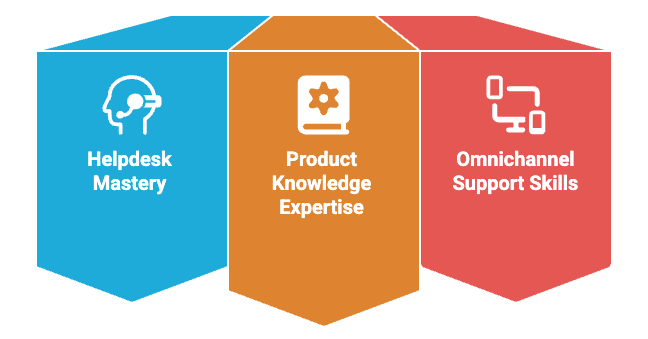
16. Helpdesk mastery
“I’m bored of typing the standard message in multiple conversations”
Well, it shouldn’t be the case. There’s something called Macros that help in automating these mundane tasks.
Customer service representatives need both technical and cognitive abilities to find, access, and respond to online-based queries.
Knowing the feature availability in the helpdesk is one thing. The ability to utilize it effectively is the key. Agents need to have a firm hand in using a helpdesk for more productive work.
They must really understand ticketing systems, chat platforms, and voice systems to provide timely assistance. Help desk software ended up providing valuable metrics and information to track team performance and measure customer service operations.
Agents who have digital literacy skills communicate well with colleagues and customers as they navigate complex agent workspaces. They might not know specific databases or software at first, but successful representatives know how to adapt quickly to evolving digital tools and add them to their workflow.
17. Product knowledge expertise
Product knowledge is the essence of exceptional customer service. Representatives must really understand the business's products, services, and policies to provide accurate support.
“I’m not sure about that. Let me check with the team and get back to you.”
This is absolutely fine if you’re facing a new scenario. But you cannot afford to do the same for simple queries or if you’ve handled the same scenario before. It is about keeping yourself updated.
This complete understanding builds customer confidence and reinforces their choice of your product over competitors.
Deep product knowledge offers these benefits:
- Representatives can gauge customer experience levels within moments of interaction
- Teams can cross-sell complementary products effectively
- Representatives handle a wider array of concerns on their own
Companies with well-trained employees who have in-depth product knowledge deliver exceptional customer experiences that lead to increased loyalty and revenue.
18. Omnichannel support skills
Omnichannel support is fundamentally different from multichannel approaches. Multichannel simply uses multiple channels, while true omnichannel creates seamless, integrated experiences across all touchpoints.
This strategy treats all potential contact points as one continuous conversation instead of separate, siloed interactions.
The results are significant—customers expect to switch between channels without repeating information. Organizations that implement complete omnichannel strategies report higher customer satisfaction, improved acquisition rates, and better competitive positioning.
Adaptability and resilience
A customer service representative's response "we've always done it this way" to technical issues frustrates most customers. The ever-changing digital world demands adaptability and resilience as crucial skills, not optional qualities. Your customer service team's success depends on knowing how to adjust to changing circumstances.

19. Embracing new technologies
Brands misunderstand their customers' comfort with technology. Research shows 78% of brands believe consumers are uncomfortable with in-store technology, while only 35% of consumers express this concern.
This gap emphasizes why brands must adopt technological breakthroughs. Customer expectations about technology are sure to surge in 2026.
Organizations making smart moves with emerging technologies will lead the future. All the same, successful adaptation needs a balance between technological efficiency and human connection to avoid what Harvard Business Review calls "engineered insincerity".
20. Stress management
Stress gets pricey across the customer service industry. Agent turnover rates between 30-45% and replacement costs of $5,000-$7,500 affect the bottom line directly.
Stressed agents struggle to deliver exceptional service, which creates poor customer satisfaction cycles.
Here are some stress management techniques:
- The 4×4 breathing method lowers blood pressure and heart rate
- Short walks to catch some fresh air outside of the office
- Physical activity increases oxygen flow to the brain
- Brief strategic breaks reset mental clarity
Resilience—knowing how to bounce back from setbacks—serves as the life-blood of long-term success in customer-facing roles. "When you can bounce back from setbacks and maintain a positive outlook, you will find greater satisfaction in your customer service career," notes one industry expert.
Customer service professionals who adapt and show resilience handle unexpected situations well and personalize interactions whatever the circumstances. This proactive approach turns potential obstacles into opportunities for exceptional service delivery.
Efficiency skills
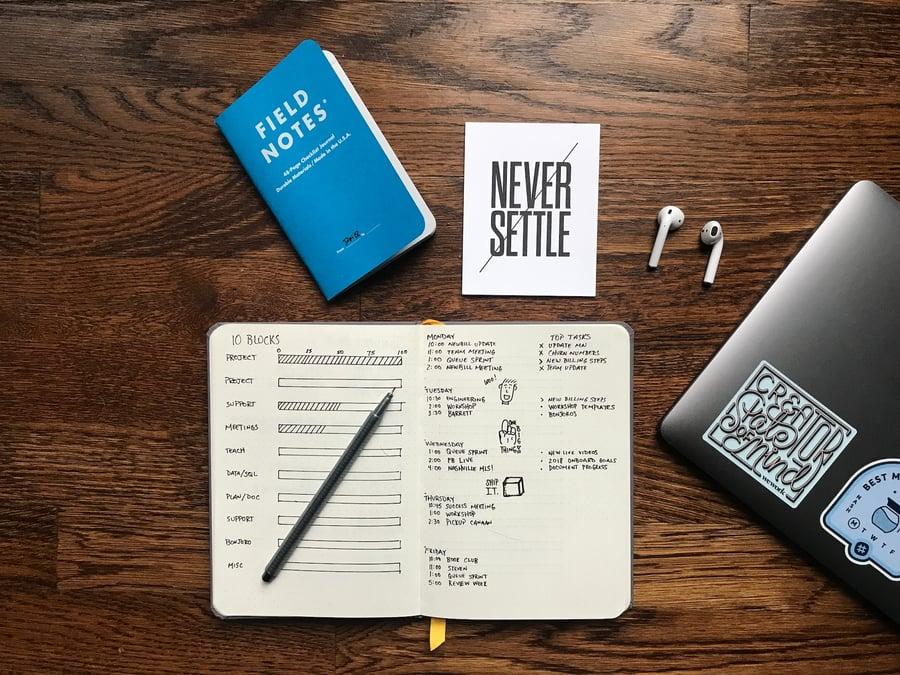
Your inbox keeps filling up while you race to clear 20 support tickets before lunch. Customer service success depends on how quickly and effectively you work.
Your efficiency skills don't just boost your productivity—they directly affect customer happiness and your company's revenue.
21. Time management
The best customer service professionals know how to control their workday through smart time management. They assign specific time slots for different types of questions and avoid trying to multitask, which often backfires.
These time management techniques work well:
- Time blocking – setting aside specific periods for tasks like email responses, follow-up calls, or knowledge base updates
- The 2-minute rule – taking care of quick tasks right away instead of putting them off
- Strategic breaks – quick mental resets between tough customer interactions
Smart time management will give you steady response times even during busy periods and reduce customer frustration from delays.
22. Prioritization abilities
Customer issues aren't all equally urgent. The best support teams know which problems need immediate attention and which can wait. They understand both time-sensitivity and how issues affect the customer's experience.
Good prioritization stops the "squeaky wheel" problem—where the loudest customers get attention irrespective of their needs. Smart teams look at things like revenue effects, how serious the problem is, and the customer's history.
It has a direct impact on your decision-making. The faster you prioritize, the better the position you’re in to make a decision. This clarity allows you to think of better solutions quickly.
As you climb the ladder, prioritization shapes the leader you want to become.
23. Process improvement mindset
Great customer service professionals don't just handle one issue at a time. They look for ways to fix underlying problems.
Spotting recurring issues with a forward-thinking approach creates standard solutions. And that makes workflows even more efficient.
Customer service representatives who think about improving processes ask:
- "Should we create a macro for this common response?"
- "What confuses customers about this feature?"
- "Can we make this procedure simpler?"
The best customer service teams encourage their staff to spot inefficiencies and suggest fixes. This way, you take part in shaping your business as well as adding value to the customers.
That’s the culture you should aspire to build.
Customer experience enhancement
You know that feeling when a company recommends something that matches your priorities perfectly? It's like they can read your mind.
The customer service skills puzzle comes together with experiences that make customers feel special and supported.
24. Personalization techniques
Generic customer service isn't enough anymore. Research shows 71% of consumers expect companies to deliver customized interactions. About 76% feel frustrated when this doesn't happen.
Companies use customer data to create relevant experiences that encourage lasting emotional bonds between customers and brands.
It’s a matter of comprehending the data and developing customer service strategies to effectively utilize it.
Customer service personalization works best through:
- Tailored communication: Using a customer's name isn't enough—messages should appeal at an individual level
- Informed recommendations: Past behaviors help suggest relevant products or solutions
- Contextual interactions: Previous purchases or interactions provide continuity
Each customer has unique needs, and this approach builds stronger relationships and loyalty.
On top of that, 78% of customers tend to buy again from companies offering customized experiences.
25. Proactive customer engagement
Smart customer service professionals don't wait for problems. They spot and fix issues before customers even notice.
This turns traditional reactive service into something more predictive. AI and data analytics help companies understand patterns and priorities. They can predict customer needs before customers realize what they want.
This proactive approach brings several benefits:
- Enhanced trust: Customers become loyal promoters when they feel valued and understood
- Reduced support volume: Quick fixes for common issues mean fewer support tickets. Teams can focus on complex questions
- Operational efficiency: Teams work better when they can predict customer needs
The best part? Proactive engagement creates lasting emotional connections and memorable customer experiences.
Comparison Table
Skill Category | Key Components | Benefits | Development Methods | Success Metrics |
Core Communication | Active listening, Verbal communication, Written communication, Non-verbal awareness, Multilingual capabilities | - Business problems reduced by 60% through better communication - Customer satisfaction increased by 70% with native language support | - Language training - Communication workshops - BLUF approach training | - Customer comprehension rates - Language service effectiveness |
Emotional Intelligence | Empathy, Patience, Self-regulation, Positive attitude, Conflict de-escalation | - Customers more forgiving of mistakes - Better customer satisfaction - Fewer escalations | - Mindfulness training - De-escalation techniques - Emotional awareness exercises | - Customer satisfaction scores - Conflict resolution rates |
Problem-Solving | Critical thinking, Creative solutions, Decision-making, Root cause analysis, Prevention | - Fewer recurring issues - Better long-term solutions - Future problems prevented | - OODA Loop framework - 5 Whys technique - Predictive analytics training | - Issue resolution rates - Prevention success rates |
Technical Skills | Helpdesk mastery, Product knowledge, Multi-channel support | - 78% customers prefer multiple channels - Customers feel more confident - Better sales opportunities | - CRM system training - Product knowledge sessions - Technical workshops | - System proficiency scores - Product knowledge tests |
Adaptability & Resilience | Technology adoption, Stress management | - Staff turnover reduced by 30-45% - Changes handled better - Service stays consistent | - Technology training - Stress management techniques - Resilience workshops | - Adaptation speed - Employee retention rates |
Efficiency Skills | Time management, Prioritization, Process improvement | - Quicker responses - Resources used better - Efficient operations | - Time blocking techniques - Priority matrix training - Process analysis workshops | - Response time metrics - Task completion rates |
Customer Experience | Personalization, Proactive engagement | - Repeat purchases increased by 78% - Less support needed | - Data analysis training - AI tool implementation - Personalization workshops | - Customer satisfaction (CSAT) - Net Promoter Score (NPS) |
Customer service skills: The ultimate guide for 2026
Poor customer service costs U.S. businesses $75 billion annually, making exceptional customer service skills more critical than ever. With 95% of consumers basing their loyalty on how companies treat them, developing the right capabilities isn't optional—it's essential for survival in today's competitive marketplace.
This comprehensive guide covers 25 essential customer service skills across six core categories:
- Core Communication: Active listening, clear verbal/written communication, and multilingual capabilities
- Emotional Intelligence: Empathy, patience, conflict de-escalation, and positive attitude maintenance
- Problem-Solving: Critical thinking, creative solutions, and proactive issue prevention
- Technical Proficiencies: Helpdesk mastery, product knowledge, and omnichannel support
- Adaptability & Resilience: Technology adoption and effective stress management
- Customer Experience Enhancement: Personalization techniques and proactive engagement
Mastering these customer service skills transforms ordinary interactions into exceptional experiences that drive customer loyalty. Companies investing in these capabilities see measurable returns through improved retention rates, increased customer lifetime value, and stronger brand reputation. The skills outlined here aren't just nice-to-have features—they're survival tools that turn regular customers into passionate brand advocates.
Frequently Asked Questions
MORE LIKE THIS
Support made easy. So your team can breathe.





.png&w=3840&q=75)
.jpg&w=3840&q=75)